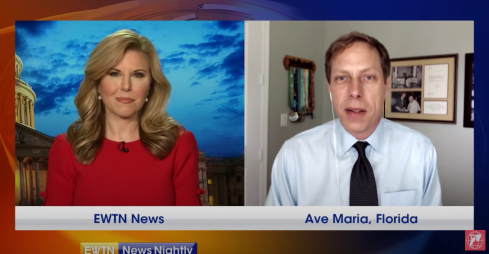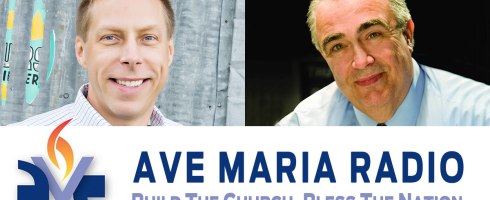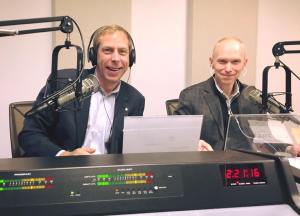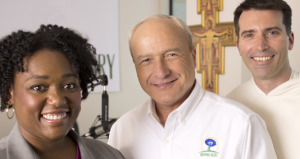
Father Corapi will preach a one-day retreat in Buffalo on Aug. 15 (George Martell photo)
JUNE 29, 2009 — Father John Corapi has a profound way of telling it like it is. The renowned preacher’s booming baritone cuts through the clutter of easy answers and points to the fundamentals of our faith. The dynamic evangelist, who fashioned his ministry around the mold of Archbishop Fulton Sheen, suspended his hectic travel schedule two years ago, then fell ill.
Now restored to health, Fr. Corapi will preach one-day retreat on the Holy Spirit in Buffalo to more than 15,000 people on Aug. 15. EWTN’s Raymond Arroyo will speak at the conference, and Catholic Answers Live host Jerry Usher will serve as emcee. Father Corapi spoke to Legatus Magazine editor Patrick Novecosky from his headquarters in Montana.
How is your health these days?
Excellent. I was incapacitated for about eight months. Even the Mayo Clinic had difficulty getting the diagnosis right. It turned out to be two very simple things: an acute Vitamin D deficiency and chronic sleep deprivation. Those two things together disrupted my immune system. Now I’m back to normal.
The topic of my doctoral thesis in dogmatic theology was on the meaning of Christian suffering in the teaching of Pope John Paul II. So we always have to look at the transcendent dimension of something like sickness or suffering and realize it’s not a useless thing. It can be a channel for grace. Pope John Paul II’s fantastic apostolic letter on suffering Salvifici Doloris is a synthesis of this.
How has your ministry changed since your recovery?
I never stopped my ministry. I was sick for a while, but I think the part you mean is the traveling. Before I became sick, we had already decided to stop traveling for a while. We had no idea that I would become sick, but if I had my normal 35-40 events per year scheduled it would have been a catastrophe.
The decision to not travel so much is based mainly on my mission, established by my superiors, to preach using the means of social communication — television, radio and the Internet. We reach millions of people that way.
Traveling and doing events is a good thing but, on the hierarchy of effectiveness, it’s much less effort to reach millions of people than going to a conference and only talking to a thousand. Next year we hope to accept a few invitations, but not nearly as many as we used to. With the volume of work we have now, it’s just not physically possible.
The world is going through trying times — both economically and morally. What’s the remedy?
In order to remedy catastrophes like this, it has to be one person at a time. Pope John Paul II said a very profound thing in his post-synod apostolic exhortation on reconciliation and penance. He said that all of the divisions we see in the world — country against country, within individual countries, within families — can all be traced back to divisions within individual human persons called sin.
So the renewal of the country, the world, and the Church comes about one person at a time. Saint Francis of Assisi gave a great example of that. He didn’t set out to reform the Church and the world, he set out to reform himself. He he did such a great job that he ended up reforming the Church — and through the Church, the world.
When enough Catholics become true to their calling, a great power will be unleashed. The reason we have this mess, in my estimation, is because the vast majority of Catholics have not lived their faith. We have a billion Catholics on the face of the earth. If they knew their faith, lived their faith, loved their faith, I assure you that the world would be a very different place.
The United States, the situation would be profoundly different if we had 60-70 million Catholics truly living their faith. But, of course, as many as 80% don’t even go to Mass on Sunday — and that’s a precept! So we have a long way to go. But it has to be kind of grassroots, one person at a time. That is why the Church has always encouraged personal holiness, because that is where the reform is going to come from.
How did the conference in Buffalo come about?
We’ve done several events in the past with Buffalo’s Catholic radio station. They wanted to do a large event, so it fell into place. This is shaping up to be the largest event that I’ve ever preached at. Already 10,000 people are registered.
The topic is going to be on the power of the Holy Spirit. It’s a powerful thing to combine Catholic teaching on the Holy Spirit in a very practical and powerful way with the troubled times we find ourselves in. These are no ordinary times. It’s not just a downturn in the economy. We’re already well into a downturn morally, economically, socially. It’s almost cataclysmic. We have the answer. The problem is that we have to convince enough of our own people that there is a problem and teach them how to solve it.
How is the Holy Spirit key to America’s spiritual awakening?
Obviously, they are intimately tied together. I’ve been a harsh critic of ourselves, meaning the Church leadership — priests, bishops and theologians. I don’t think we’ve done a particularly good job in my lifetime. We’ve had great popes; the top of the hierarchy has always been fantastic. But we’ve had a serious problem with “middle management.” There has been a significant problem with bishops and priests. Although, it’s better now than it was 20 years ago. However, the vast majority of Catholics aren’t even going to Church, so we shouldn’t wonder that the Church has been losing its influence on an increasingly secularized society.
You have to ask yourself why people have drifted away. I’m sure there are a lot of societal reasons. We don’t have control over those reasons, but we have control over the reasons inside the Church. You can start with the top. There is an old saying: “The fish stinks from the head down.” Lousy leadership is a disaster.
I once asked an old Carmelite nun why we have a crisis of leadership inside the Church as well as in the secular order. She never batted an eye. She had been a nun for over 60 years and a prioress for decades. She said, “That’s easy. Punishment for sin.” Why do we have bad leadership? Punishment for sin. It’s very biblical. You go back to the Old Testament and you see that leadership was removed from the people of God, the chosen people, because of infidelity to the covenant. They cried out to God because they had no priest, prophet or king. Why not? Because they were unfaithful.
One can recall what happened during the tenure of Pope Paul VI, when he came out with his landmark and prophetic encyclical Humane Vitae. Significant numbers of bishops, priests, theologians and others rejected it. They absolutely rejected it. The majority of Canadian bishops signed the infamous Winnipeg Statement that just categorically rejected Humane Vitae. That kind of rebellion is catastrophic. Paul VI was prophetic with that encyclical and much of what he warned about has come to pass.
The argument can be strongly made that the proliferation of abortion can pretty much be traced to artificial contraception. It’s almost a cause-and-effect kind of thing, and Paul VI warned about that. But large numbers of Church leaders rejected it and were so bold as to even reject it in writing, and that’s not without consequences. There were profound consequences not only in the Church but in the United States, Canada and the whole world. It’s had a profound effect on de-Christianizing the culture.
I always hope that things will get turned around. My mother reminds me periodically that we know the last chapter: We win! So I don’t know when it will get turned around. And don’t think for a minute that the best is going to happen without a bitter fight! We’re just heading into a tremendous period of spiritual and moral combat. We have a situation where the secular order, government and so forth are unashamedly anti-Christian and the Catholic Church is getting the brunt of the attack. I’m sure it’s going to get worse before it gets better. What we have to go through between now and then, I’m not so sure. I hope for the best, but I plan for the worst.
Tell me more about the focus of your ministry.
Before I was ordained, Fr. James Flanagan, the founder of my congregation —the Society Our Lady of the Most Holy Trinity — told me that my mission in the Church would be to preach using the means of social communication using Archbishop Fulton Sheen as the model. It took me a few years to get on television and radio, but around 1996 we started to get on EWTN radio and then television — then non-stop Saturday and Sunday night for 12 years.
Now with the Internet, my website is reaching more and more people. We have a weekly webcast called Weekly Wisdom. We’re almost ready with a new redesigned website with new downloadable material. When I started, we were reaching dozens, then hundreds, then thousands. Now it’s up in the millions and tens of millions. EWTN tells me that we reach over 130 countries and territories every week — over 150 million households and that’s just television. We’re also on dozens of Catholic radio networks.
With the Internet, you can say something, put it on your website and before you can blink your eye it’s all over the place. So it’s a very rapid deployment (to use a military term) of news. With all those things together, we are reaching more and more people more effectively.
Patrick Novecosky is the editor of Legatus Magazine. An abridged version of this interview was published in the July/August 2009 issue of Legatus Magazine.
Tags: Buffalo, EWTN, Fr. John Corapi, Holy Spirit













